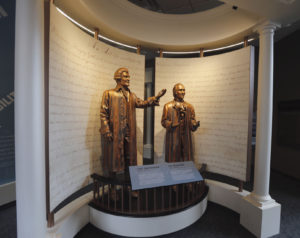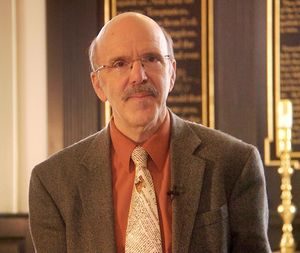Diversity Enshrined: Religious freedom and the American experiment
Written by John Ragosta, Lead Faculty, Lifetime Learning Summer Jefferson Symposium; Fellow, Virginia Foundation for the Humanities. John Ragosta column: originally published by the Richmond Times-Dispatch. Reprinted with permission.
Today is Religious Freedom Day, a chance to remember the critical importance to our nation of Thomas Jefferson’s Virginia Statute for Establishing Religious Freedom and the liberty that it enshrined.
Recent celebrations of this anniversary have reminded us that our Founders embraced religious freedom for all, “the Jew and the Gentile, the Christian and Mahometan, the Hindoo, and infidel of every denomination,” in Jefferson’s words. As battles over wedding cakes and club memberships have proliferated, commentators have also rightly noted that religious freedom was not intended to override “neutral” laws that did not directly regulate religion; after all, not long ago claims of religious freedom were misused in an effort to justify racial discrimination in education, housing, and commercial services.
Those are important issues. But this year as Religious Freedom Day approached, I was thinking about another: Why did Jefferson think that this issue was so critical for the country, remembering it on his tombstone along with authorship of the Declaration of Independence and founding of the University of Virginia — religious freedom, political freedom, educational opportunity? And why did he believe that religious freedom demanded strict separation of church and state?
In Jefferson’s time, most countries and most states had an “official” religion. In some, it was the Catholic Church, in others, Anglican. Some recognized a special status for Protestants; others endorsed all Christians. For Jefferson, all of these created a serious danger. When government and religious officials worked together, even when they simply classified a particular belief as orthodox or preferred, they inevitably sought to control what people would think and believe, creating a pernicious aristocracy — “kings, nobles, and priests,” to use Jefferson’s phrase. But if the republic was to survive, people must be free to think, free to challenge any orthodoxy, particularly any “official” position. In fact, Jefferson understood that of the three great achievements of his life — religious freedom, political freedom, and educational opportunity — religious freedom was the foundation; without it, you could have neither political freedom nor enlightened education.

2015, JOE MAHONEY/TIMES-DISPATCH
Eighteenth-century evangelicals were equally passionate in embracing separation of church and state. Theologically, keeping government out of religion, not even providing an “indulgence, preferment or even protection,” as Baptist preacher John Leland said, was the only way to ensure that an individual’s religion was purely a free-will offering to God; otherwise people might think that one was religious for the “loaves and fishes.” Leland warned that letting government endorse religion was a “species of idolatry … acknowledging a power, that the head of the church, Jesus Christ, never appointed.” Mixing church and state corrupted both.
Politically, evangelicals knew that if government had authority to officially recognize Christianity, it could also choose to promote Catholicism, Presbyterianism, Judaism, or Islam. Government had no such authority. Chesterfield dissenters insisted that the government should not establish “the Christian religion lest thereby we become our own enemys and weaken this infant State.” Even associating a particular religion with being patriotic Americans, a preferment “in public opinion” according to Jefferson, was dangerous. Your religion could have no official influence on your place in the republic; “our civil rights have no dependence on our religious opinions,” the Virginia Statute says.
Thankfully for the new nation, Article VI of the Constitution embeds these concepts, declaring that “no religious test shall ever be required as a qualification to any office or public trust under the United States.” A free, democratic republic demands no less.
All of this was brought to mind in December when a Roy Moore spokesperson insisted that Muslims could not serve in Congress under the Constitution because they could not take the oath of office on the Bible — never mind that Jews, agnostics, and atheists would be precluded under the same logic. (CIA Director John Brennan took the oath of office on George Washington’s copy of the Constitution, a firm reminder that we have a government of laws, not of men, and not of religion.) Now, Moore is no expert on the Constitution and religious freedom, as he demonstrated repeatedly by his efforts as Alabama’s chief judge to endorse officially the Ten Commandments and ignore Supreme Court decisions. But ignorance of Article VI is important and Religious Freedom Day is an excellent opportunity to remind ourselves of its central role not only to our heritage, but the functioning of the republic. People can, of course, elect whom they choose to office, and do so for whatever reasons they choose, including religious reasons. But in America, no one is precluded from serving (in the government or the military) by reason of his or her religion, and no one can claim that “good” Americans come only from one religion, race, ethnicity, or gender.
E Pluribus Unum: America’s strength and exceptionalism is in its diversity. Or, as Jefferson said with respect to religion, “divided we stand, united we fall.”
- Testing, Diagnosing, and Treating Primary Aldosteronism: A Leading Cause of Hard-to-Treat Hypertension
- Life at the Top: Climate Change in Utqiaġvik, Alaska
- The Only Thing We Have to Fear is Fear Itself
- UVA Club of Tidewater: Hoos at Harbor Park
- UVA Club of Washington, DC: Diplomacy & Dialogue with Ambassador Mull
- UVA Club of the Virginia Peninsula: Admitted Student Celebration
